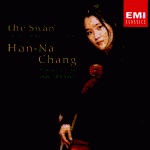In this collection of short works for cello and orchestra Han-Na Chang displays the robust tone and broad musical strokes that have gained her some recognition as a rising star. She has an easy technical facility and a smooth bow, with plenty of power. There is obviously strong talent here and a promising future, but Chang still needs to develop a wider palette of colors: Her always beautiful tone is pretty much the same in each piece. Whether it’s the delicate Après une rêve of Fauré or the emotional Vocalise of Rachmaninov, there is no difference in shade or density or texture. She also makes some poor interpretive decisions, as in Dvorák’s Waldesruhe, which she treats as if it were a major moment in the same composer’s Cello Concerto. Nina Kotova’s version on her Philips debut is more in character. Kotova also has more to say in the Tchaikovsky Nocturne, the only other piece that appears on both programs.
The Philharmonia Orchestra doesn’t do Chang any favors either. For the most part, Slatkin and the orchestra sound as if they’re just doing another routine gig. The occasional flute or oboe solo turns are quite good, but the wind section often has disjointed entrances, as in the beginning of the Glazunov or the middle of the Sicilienne. EMI generally keeps the orchestra at such a low level that accompanying figures are often indistinct. In fact, the balance is the equivalent of an old acoustic recording where the soloist is right in front of the horn and the orchestra is buried in the back. The Dvorák is especially hurt by this–the rolling violin figures are only so much mush.
As this disc features works for cello and orchestra, its only real comparison would be with a recording such as Mischa Maisky’s “Adagio” collection on DG. Maisky’s playing has much more depth, and the sound quality is better. And while Kotova may not have as beautiful a sound as Chang, she’s certainly more enjoyable to listen to, and the overall production on her disc is much better, with much more interesting repertoire.
































